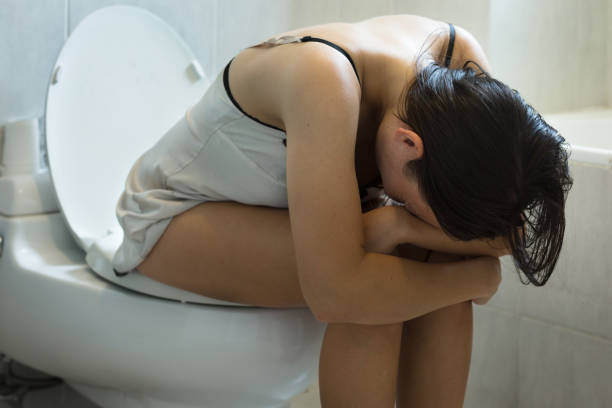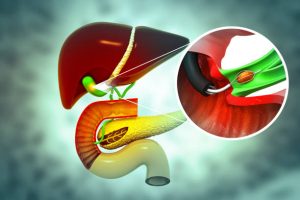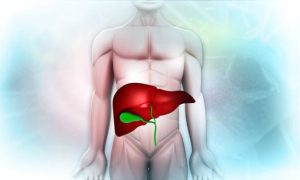
A woman leaning over on the toilet with head on her lap trying to use the bathroom. Strugging with bad cramps and sharp pains.
What is Blood in Stool?
Blood in the stool refers to any bleeding that occurs in the digestive tract, appearing as bright red, maroon, or black stool. It can be a sign of gastrointestinal bleeding due to various causes, from mild conditions like hemorrhoids to more serious diseases such as cancer.
Types of Blood in Stool
- Hematochezia: Bright red blood that is usually indicative of bleeding from the lower digestive tract, such as the colon, rectum, or anus.
- Melena: Black or tarry stools, indicating bleeding from the upper gastrointestinal tract, such as the stomach or small intestine.
- Occult Blood: Blood that is not visible to the naked eye but can be detected through lab tests.
Main Causes of Blood in Stool
- Hemorrhoids: Swollen blood vessels in the rectum or anus.
- Anal Fissures: Small tears in the lining of the anus.
- Diverticulosis: Small pouches in the colon that can bleed.
- Colon Polyps: Growths in the colon that can cause bleeding and may lead to cancer.
- Colorectal Cancer: Malignant growths in the colon or rectum.
- Inflammatory Bowel Disease (IBD): Conditions like Crohn’s disease and ulcerative colitis.
- Peptic Ulcers: Sores in the stomach lining or the upper part of the small intestine.
- Gastrointestinal Infections: Infections can irritate the lining of the intestines, causing bleeding.
- Angiodysplasia: Abnormal blood vessels in the gastrointestinal tract.
- Diverticulitis: Infected or inflamed pouches in the digestive tract.
Signs and Symptoms of Blood in Stool
- Bright red or maroon blood in or on the stool
- Black, tarry stools (indicating older blood)
- Abdominal pain or cramping
- Unexplained weight loss
- Weakness, fatigue, or dizziness (due to blood loss)
- Changes in bowel habits (diarrhea, constipation)
- Nausea or vomiting
- Anemia (low red blood cell count)
Risk Factors for Blood in Stool
- Age (higher risk in older adults)
- Family history of colorectal cancer or gastrointestinal disorders
- Chronic constipation or diarrhea
- Poor diet (low in fiber, high in fat)
- Smoking and alcohol consumption
- Obesity
- Sedentary lifestyle
- Chronic use of NSAIDs (non-steroidal anti-inflammatory drugs)
How to Prevent Blood in Stool
- Maintain a high-fiber diet to promote healthy bowel movements.
- Stay hydrated by drinking plenty of water.
- Exercise regularly to prevent constipation.
- Avoid straining during bowel movements.
- Avoid excessive use of NSAIDs or other medications that can irritate the digestive tract.
- Get regular screenings for colorectal cancer, especially if you are over 50 or have a family history.
How is Blood in Stool Diagnosed?
- Physical Examination: A doctor may perform a rectal exam to check for hemorrhoids, fissures, or other abnormalities.
- Fecal Occult Blood Test (FOBT): A lab test to detect hidden blood in the stool.
- Colonoscopy: A scope is used to examine the colon and rectum for bleeding, polyps, or tumors.
- Sigmoidoscopy: A similar procedure that focuses on the lower part of the colon.
- Upper Endoscopy: To check for bleeding in the upper gastrointestinal tract.
- CT Scan: To detect structural abnormalities or growths in the intestines.
How to Treat Blood in Stool
- Treatment for Hemorrhoids: Creams, sitz baths, or surgical removal.
- Anal Fissures: Topical creams, stool softeners, or surgery if needed.
- Diverticulosis: Dietary changes, antibiotics, or surgery in severe cases.
- Colon Polyps: Removal during a colonoscopy.
- Inflammatory Bowel Disease (IBD): Medications like anti-inflammatory drugs or immune system suppressors.
- Peptic Ulcers: Medications to reduce stomach acid, or antibiotics for H. pylori infection.
- Surgery: In cases of colorectal cancer or severe polyps.
Home Remedies for Blood in Stool
- Increase Fiber Intake: Foods like whole grains, fruits, and vegetables can ease bowel movements.
- Stay Hydrated: Drinking water softens stools and prevents straining.
- Sitz Baths: Sitting in warm water for 10-15 minutes can soothe hemorrhoids or anal fissures.
- Avoid Straining: Use a stool softener if necessary to prevent constipation.
- Probiotics: Help maintain gut health and reduce inflammation.
- Aloe Vera Juice: Known for its soothing properties on the digestive tract.
Ayurvedic Medicine to Cure Blood in Stool
- Triphala: A well-known Ayurvedic formula that supports bowel movements and gut health.
- Psyllium Husk (Isabgol): Acts as a natural fiber supplement to relieve constipation.
- Bilva (Bael): Balances digestion and helps with conditions like dysentery and diarrhea.
- Kutaja: Useful for treating gastrointestinal disorders, especially diarrhea with blood.
- Amla (Indian Gooseberry): Supports digestive health and relieves constipation.
Precautions
- Do not ignore persistent blood in the stool.
- Avoid self-medication without consulting a healthcare professional.
- Maintain a healthy diet and lifestyle to prevent gastrointestinal issues.
- Avoid foods that are irritating to the stomach, such as spicy or fatty foods.
- Seek medical help if symptoms worsen or are accompanied by significant pain, weight loss, or fatigue.
Self-Care Tips
- Eat small, frequent meals to avoid overwhelming the digestive system.
- Avoid over-the-counter painkillers that can irritate the stomach, such as NSAIDs.
- Practice good bowel habits by using the restroom as soon as you feel the urge.
- Manage stress, as stress can contribute to gastrointestinal problems.
Conclusion
Blood in the stool can range from minor issues like hemorrhoids to serious conditions like colorectal cancer. Early detection and appropriate treatment are essential for addressing the underlying causes. Maintaining a healthy lifestyle, including a fiber-rich diet and regular exercise, can help prevent many of the conditions that cause blood in the stool.
Disclaimer
The information provided here is for educational purposes only and should not be considered as medical advice. Consult a healthcare professional for an accurate diagnosis and treatment plan.
Additional Tips
- Avoid excessive consumption of red meat and processed foods, which may increase the risk of colorectal cancer.
- Get regular screenings for gastrointestinal health if you are at higher risk.
- Incorporate yoga and meditation into your routine to help manage stress and promote digestion.








